Power distribution systems - Project examples
-
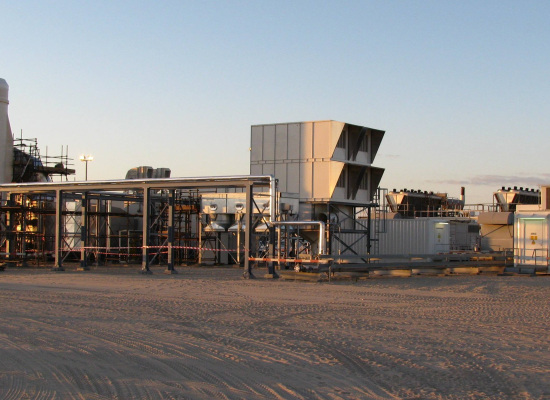
Mauritania - 50 MW Thermal Power Plant in Zouerate
SNIM (Société Nationale Industrielle et Minière) is a company that extracts the iron ore deposits around the mining city Zouerate, located in the Tiris Zemour region in the north of Mauritania. In order to cover its short-term electricity demand, M/s. SNIM commissioned TRACTEBEL ENGINEERING S.A. to carry out a feasibility study for a 50 MW thermal power plant in the city of Zouerate. The study on the generation units shall evaluate the following two variants:
- Conventional heavy fuel oil-fired generation units
- Dual fuel generation units running on heavy fuel oil and natural gas
Parts of the tasks under this feasibility study have been subcontracted to intec.
intec's services
intec contributed to the following tasks:
Phase 1: Analysis of the SNIM's electricity demand in the short, medium and long term, and definition of a medium and short-term supply strategy
- Site visit and data collection plus assessment of existing studies
- Demand analysis and energy balance
Phase 2: Study of the technology variants and dimensioning of production units (preliminary design)
- Analysis of advantages and disadvantages of each variant
- Proposal for a choice of technology and its justification
- Optimisation of generator unit dimensioning and cost estimates
Phase 3: Feasibility study for the chosen variant
- Site selection and climatic conditions
- Optimisation of nominal capacity of the single production units and determination of principal technical specifications
- Stability and operation analysis of SNIM's electricity network
- Analysis of the project’s technical and economic feasibility
- Environmental and Social Impact Assessment (ESIA)
- Geotechnical survey and laboratory analyses
- Detailed design study and elaboration of tender documents
Client
TRACTEBEL ENGINEERING S.A.Financing
TRACTEBEL ENGINEERING S.A.Period of implementation
08.2013 - 07.2016 -
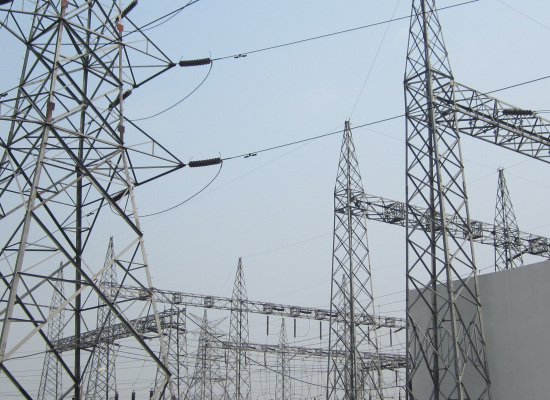
Bangladesh - Feasibility Study of the Transmission System Improvement, Western Zone
Bangladesh faces chronic power shortage with an estimated demand gap in the magnitude of 1900 MW and power outages in urban areas between 5-10 hours a day. Taking into account the demand forecast(s), the current load shedding and the extreme power shortage and operational constraints, PGCB launched the "Power Transmission Improvement Programme" and approached the Government for external sector assistance.
The project covers the following technical measures:- Construction of 132 kV double-circuit transmission lines and line in-/line outs to substations
- Stringing of a second circuit on an existing 132 kV line and installation of OPGW
- Construction of 230 kV double-circuit transmission lines and line-in/line-out to existing lines
- New construction of three 132/33 kV and one 230/132 kV substation
- Extension of a total of five 132/33 kV and one 230/132 kV substation (1 GIS substation)
intec's services
Feasibility study/technical and economic justification of the planned expansion measures, i.e.:
- Network analysis and update of load flow calculations
- Assessment of socio-economic benefits
- Preliminary line route identification
- Preliminary survey of substation areas
- Layout and design on feasibility level for the 230 and 132 kV lines, substations and substation extensions
- Identification of potential training needs in terms of O&M
- Cost estimate, economic and financial analysis of planned measures
- Initial Environmental Examination (IEE) and mitigation measures
- Detailed line route survey for 70 km of 230 DC line and a total of 85 km of 132 DC lines
- Full ESIA for the selected technical measures to be implemented and Environmental and Social Management Plan (ESMP)
Tendering of resulting first-priority measures, i.e.:
- Design and elaboration of technical specifications
- Determination of the bills of quantities
- Preparation of the tender dossiers (technical and commercial)
- Assistance during tendering
- Bid evaluation
- Assistance during contract negotiations
in total for six different tender packages (three substation packages and three transmission line packages).
Client
Power Grid Company of Bangladesh Ltd. (PGCB)Financing
KfW EntwicklungsbankPeriod of implementation
01.2014 - 07.2017 -
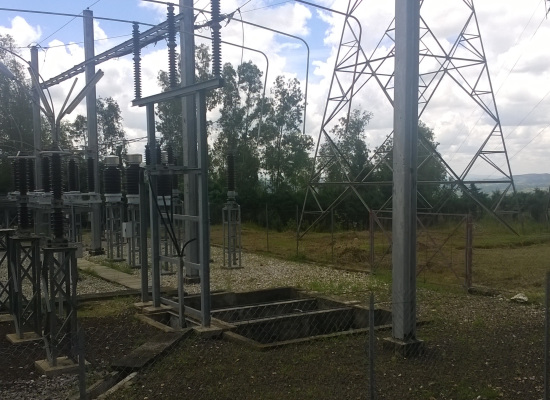
Rwanda, Burundi - Regional Interconnection Project (220 kV Transmission Line Kigoma - Butare - Ngozi - Gitega and 220/110 kV Substations)
The project was part of the NELSAP Regional Transmission Program that aimed at interconnecting five of the Nile Equatorial Lakes Countries, i.e. Burundi, DR Congo, Kenya, Rwanda and Uganda.
The project interconnected the electricity networks of Burundi and Rwanda through the construction of a new 220 kV single-circuit transmission line with a total length of 143 km. The line will initially be operated on the 110 kV level and might later be upgraded to 220 kV.
The project also included the construction of two new 220/110 kV substations, the extension of two existing 110 kV substations and the construction of 11.2 km of 30 kV line for rural electrification of Gisagara (Rwanda).
intec's services
- Review of existing feasibility studies
- Update of the Environmental and Social Management Plan (ESMP)
- Detailed design
- Preparation of complete tender documents for EPC Contractors (2 lots)
- Technical assistance during the procurement process, i.e. tendering, bid evaluation and contract award
- Preparation of a detailed Resettlement Action Plan (RAP) and monitoring of its implementation
- Design approval and supervision of implementation works
- Witnessing of factory acceptance tests, supervision of testing and commissioning
- Certification of Contractor's invoices and payments
- Monitoring and supervision of the implementation of the ESMP
- Safeguarding of project's compliance with KfW's and the World Bank's sustainability guidelines
- Technology transfer and training of employers' and project executing agency's staff
- Representation in the respective project steering and technical committees
Client
REGIDESO (Burundi), Energy Development Corporation Ltd. (Rwanda)Financing
KfW EntwicklungsbankPeriod of implementation
03.2015 - 06.2017
Mauritania - 50 MW Thermal Power Plant in Zouerate
SNIM (Société Nationale Industrielle et Minière) is a company that extracts the iron ore deposits around the mining city Zouerate, located in the Tiris Zemour region in the north of Mauritania. In order to cover its short-term electricity demand, M/s. SNIM commissioned TRACTEBEL ENGINEERING S.A. to carry out a feasibility study for a 50 MW thermal power plant in the city of Zouerate. The study on the generation units shall evaluate the following two variants:
- Conventional heavy fuel oil-fired generation units
- Dual fuel generation units running on heavy fuel oil and natural gas
Parts of the tasks under this feasibility study have been subcontracted to intec.
intec's services
intec contributed to the following tasks:
Phase 1: Analysis of the SNIM's electricity demand in the short, medium and long term, and definition of a medium and short-term supply strategy
- Site visit and data collection plus assessment of existing studies
- Demand analysis and energy balance
Phase 2: Study of the technology variants and dimensioning of production units (preliminary design)
- Analysis of advantages and disadvantages of each variant
- Proposal for a choice of technology and its justification
- Optimisation of generator unit dimensioning and cost estimates
Phase 3: Feasibility study for the chosen variant
- Site selection and climatic conditions
- Optimisation of nominal capacity of the single production units and determination of principal technical specifications
- Stability and operation analysis of SNIM's electricity network
- Analysis of the project’s technical and economic feasibility
- Environmental and Social Impact Assessment (ESIA)
- Geotechnical survey and laboratory analyses
- Detailed design study and elaboration of tender documents
Client
TRACTEBEL ENGINEERING S.A.Financing
TRACTEBEL ENGINEERING S.A.Period of implementation
08.2013 - 07.2016Bangladesh - Feasibility Study of the Transmission System Improvement, Western Zone
Bangladesh faces chronic power shortage with an estimated demand gap in the magnitude of 1900 MW and power outages in urban areas between 5-10 hours a day. Taking into account the demand forecast(s), the current load shedding and the extreme power shortage and operational constraints, PGCB launched the "Power Transmission Improvement Programme" and approached the Government for external sector assistance.
The project covers the following technical measures:
- Construction of 132 kV double-circuit transmission lines and line in-/line outs to substations
- Stringing of a second circuit on an existing 132 kV line and installation of OPGW
- Construction of 230 kV double-circuit transmission lines and line-in/line-out to existing lines
- New construction of three 132/33 kV and one 230/132 kV substation
- Extension of a total of five 132/33 kV and one 230/132 kV substation (1 GIS substation)
intec's services
Feasibility study/technical and economic justification of the planned expansion measures, i.e.:
- Network analysis and update of load flow calculations
- Assessment of socio-economic benefits
- Preliminary line route identification
- Preliminary survey of substation areas
- Layout and design on feasibility level for the 230 and 132 kV lines, substations and substation extensions
- Identification of potential training needs in terms of O&M
- Cost estimate, economic and financial analysis of planned measures
- Initial Environmental Examination (IEE) and mitigation measures
- Detailed line route survey for 70 km of 230 DC line and a total of 85 km of 132 DC lines
- Full ESIA for the selected technical measures to be implemented and Environmental and Social Management Plan (ESMP)
Tendering of resulting first-priority measures, i.e.:
- Design and elaboration of technical specifications
- Determination of the bills of quantities
- Preparation of the tender dossiers (technical and commercial)
- Assistance during tendering
- Bid evaluation
- Assistance during contract negotiations
in total for six different tender packages (three substation packages and three transmission line packages).
Client
Power Grid Company of Bangladesh Ltd. (PGCB)Financing
KfW EntwicklungsbankPeriod of implementation
01.2014 - 07.2017Rwanda, Burundi - Regional Interconnection Project (220 kV Transmission Line Kigoma - Butare - Ngozi - Gitega and 220/110 kV Substations)
The project was part of the NELSAP Regional Transmission Program that aimed at interconnecting five of the Nile Equatorial Lakes Countries, i.e. Burundi, DR Congo, Kenya, Rwanda and Uganda.
The project interconnected the electricity networks of Burundi and Rwanda through the construction of a new 220 kV single-circuit transmission line with a total length of 143 km. The line will initially be operated on the 110 kV level and might later be upgraded to 220 kV.
The project also included the construction of two new 220/110 kV substations, the extension of two existing 110 kV substations and the construction of 11.2 km of 30 kV line for rural electrification of Gisagara (Rwanda).
intec's services
- Review of existing feasibility studies
- Update of the Environmental and Social Management Plan (ESMP)
- Detailed design
- Preparation of complete tender documents for EPC Contractors (2 lots)
- Technical assistance during the procurement process, i.e. tendering, bid evaluation and contract award
- Preparation of a detailed Resettlement Action Plan (RAP) and monitoring of its implementation
- Design approval and supervision of implementation works
- Witnessing of factory acceptance tests, supervision of testing and commissioning
- Certification of Contractor's invoices and payments
- Monitoring and supervision of the implementation of the ESMP
- Safeguarding of project's compliance with KfW's and the World Bank's sustainability guidelines
- Technology transfer and training of employers' and project executing agency's staff
- Representation in the respective project steering and technical committees
Client
REGIDESO (Burundi), Energy Development Corporation Ltd. (Rwanda)Financing
KfW EntwicklungsbankPeriod of implementation
03.2015 - 06.2017-
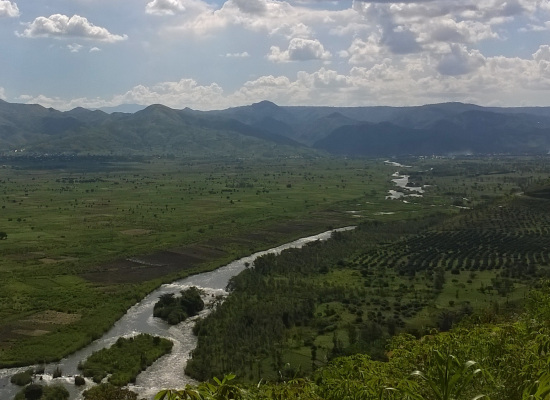
Congo (RD) - Revision of the Studies on the 220 kV Line Kamanyola - Buhandahanda
The 220 kV Kamanyola - Buhandahanda line shall evacuate the electricity generated by the Ruzizi III Hydropower Plant, which is part of the 220 kV interconnected network of the CEPGL (Communauté Economique des Pays des Grands Lacs - Economic Community of the Great Lake Countries). Studies for this line were finalised in September 2011 and shall be revised under the present project. The aim is to take into consideration the new locations of the Kamanyola and Buhandahanda Substations, and the new line concept.
intec's services
- Review of the project's technical feasibility; in particular through revision of the line's general concept (review of the line route and harmonisation of the design/double-circuit line with possibly only one single circuit operated in the first phase), study of the grid stability with the new line, set-up of a simulation model of the interconnected network, power distribution and load flow studies, review of the line protection system)
- Review of the project's economic and financial feasibility (cost estimates, economic and financial viability, proposals for project financing and implementation)
- Preparation of the detailed design for the revised line concept, elaboration of the longitudinal profile on the basis of satellite data, and tower spotting
- Preparation of an Environmental and Social Impact Assessment (ESIA) and an Environmental Management Plan (EMP) to conform with international standards, and elaboration of a Resettlement Action Plan (RAP)
- Elaboration of the tender dossier
- Organisation of a validation seminar with EGL, SNEL (National Power Company of Congo), the Steering Committee and KfW
- Participation in the project appraisal mission
Client
Energie des Grands Lacs - EGLFinancing
KfW EntwicklungsbankPeriod of implementation
07.2015 - 03.2017 -
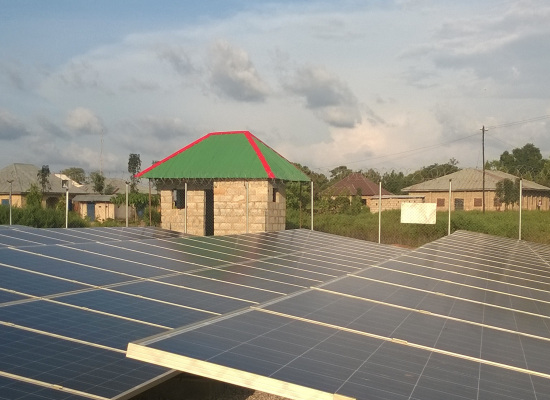
Nigeria - Grid-Connected Solar Power Plant (Feasibility Study & Pre-Feasibility Studies)
In its Roadmap for Power Sector Reforms (2013), Nigeria has articulated its commitment to accelerate economic growth while reducing its GHG emissions, i.a. by introducing renewables to the energy mix. The present project shall contribute to this goal. It includes the following main tasks:
- an in-depth feasibility study including power system integration studies for the development of a 50 MW solar plant at a single site in the State of Bauchi, allowing for modular scale-up and phased development, intended to lead to an investment bid;
- a pre-feasibility study on possible cogeneration feeder plants (20-50 MW) adjacent to existing and upcoming hydropower plants (e.g. Shiro-ro, Jebba, Kainji), grid-connected, centralized and/or distributed, in-tended to lead to functional bids;
- a pre-feasibility study on possible embedded generation plants within privatised DISCOs, grid-connected or distributed, intended to lead to functional bids;
- the preparation of tender documents for EPC;
- a training and capacity building programme.
intec's services
For all three studies, the scope of work includes i.a.:
- site identification and screening
- determination of solar resource
- selection of two best-ranked sites on the basis of technical-economic analyses
- investigation of grid integration and topographical issues
- preparation of an environmental and social management framework
- development of an investment plan
- elaboration of technical concept for the PV plant and the interconnection to the grid
- sensitivity analyses, commercial considerations
- determination of optimum plant sizes and potential for future expansion
- selection of highest-ranked sites and preparation of concept note and design, preliminary topographical survey and geotechnical investigation
In addition, the in-depth feasibility study for the investment bid includes the following services:
- preparation of concept design, drawings, cost estimate and implementation schedule
- comparison of off-take options (bulk trader or sale to DISCO) and feasibility of interconnection policies
- environmental scoping for the selected sites and preparation of ToR for a full ESIA
- preparation of complete tender documents for EPC
- preparation of a deployment and a marketing plan
The pre-feasibility scoping studies have the following additional deliverables:
- investor profiling and ranking, investment and development timelines
- preparation of business plans
- configuration and specification of respective projects and their justification, identification of key milestones, activities, potential partners, etc.
- indicative options for possible ownership and financing (third-party PPA, owner-operated, hybrid financing, capital lease arrangements, etc.)
The project also includes an extensive training, capacity building and dissemination programme, which includes inter alia:
- Seminars and workshops in Abuja on
PV technology, PV project planning in the Nigerian context
Economic and financial analysis of PV power plants
PV power plant basic design, technical specifications, tender documents and ESIA- A one-week study tour to Germany: visits to large-scale PV power plants, research facilities, a regional dispatch centre, a manufacturer of PV modules, project developers, EPC Contractors, etc.
- On-the-job training along all project activities.
Client
Federal Ministry of the Environment, Nigeria Erosion and Watershed Management Project (NEWMAP)Financing
World BankPeriod of implementation
03.2015 - 03.2017 -
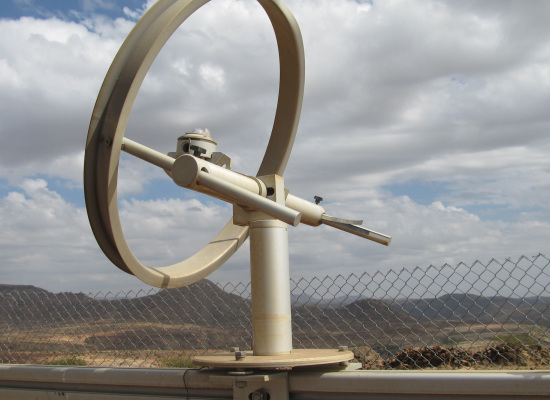
Eritrea - Solar PV Mini-Grids for two Rural Towns and Surrounding Villages
Eritrea’s energy supply system is characterized by massive dependence on traditional biomass fuels to cover its domestic energy requirements, a lack of easy access by the majority of the country’s population to modern energy; and total reliance on imported oil as a source of modern energy. Less than 10% of Eritreans in rural areas have access to electricity. Therefore, an effort by the Ministry of Energy and Mines and international donor organizations is made to promote rural electrification through sustainable sources.
The present project included the design and tendering of two mini-grid PV systems in Areza and Maidma (total 2.25MWp PV), designed as hybrid plants with storage units (3.4 MWh Li-Ion Battery), and diesel gen-sets (5 gensets; total 1.3 MVA). The renewable energy fraction of the system is higher than 70%. The local distribution grid was designed and tendered by Eritrea Electric Corporation and the generation side was handled by intec.
intec's services
- Detailed demand assessment and forecasts
- Design of the two hybrid systems (PV, diesel, battery storage) including their synchronisation with the distribution system and related components (site assessments, PV energy yield assessments, system sizing, design, project budget) as well as optimization for Levelized Electricity Cost
- Preparation of (a) tender dossier(s) for supply and installation, in compliance with EU/EDF procurement regulations, including BoQ and detailed technical specifications
- Support during the tender period
- Assistance in bid evaluation and contract preparation
Client
Ministry of Energy and MinesFinancing
European CommissionPeriod of implementation
12.2015 - 01.2017
Congo (RD) - Revision of the Studies on the 220 kV Line Kamanyola - Buhandahanda
The 220 kV Kamanyola - Buhandahanda line shall evacuate the electricity generated by the Ruzizi III Hydropower Plant, which is part of the 220 kV interconnected network of the CEPGL (Communauté Economique des Pays des Grands Lacs - Economic Community of the Great Lake Countries). Studies for this line were finalised in September 2011 and shall be revised under the present project. The aim is to take into consideration the new locations of the Kamanyola and Buhandahanda Substations, and the new line concept.
intec's services
- Review of the project's technical feasibility; in particular through revision of the line's general concept (review of the line route and harmonisation of the design/double-circuit line with possibly only one single circuit operated in the first phase), study of the grid stability with the new line, set-up of a simulation model of the interconnected network, power distribution and load flow studies, review of the line protection system)
- Review of the project's economic and financial feasibility (cost estimates, economic and financial viability, proposals for project financing and implementation)
- Preparation of the detailed design for the revised line concept, elaboration of the longitudinal profile on the basis of satellite data, and tower spotting
- Preparation of an Environmental and Social Impact Assessment (ESIA) and an Environmental Management Plan (EMP) to conform with international standards, and elaboration of a Resettlement Action Plan (RAP)
- Elaboration of the tender dossier
- Organisation of a validation seminar with EGL, SNEL (National Power Company of Congo), the Steering Committee and KfW
- Participation in the project appraisal mission
Client
Energie des Grands Lacs - EGLFinancing
KfW EntwicklungsbankPeriod of implementation
07.2015 - 03.2017Nigeria - Grid-Connected Solar Power Plant (Feasibility Study & Pre-Feasibility Studies)
In its Roadmap for Power Sector Reforms (2013), Nigeria has articulated its commitment to accelerate economic growth while reducing its GHG emissions, i.a. by introducing renewables to the energy mix. The present project shall contribute to this goal. It includes the following main tasks:
- an in-depth feasibility study including power system integration studies for the development of a 50 MW solar plant at a single site in the State of Bauchi, allowing for modular scale-up and phased development, intended to lead to an investment bid;
- a pre-feasibility study on possible cogeneration feeder plants (20-50 MW) adjacent to existing and upcoming hydropower plants (e.g. Shiro-ro, Jebba, Kainji), grid-connected, centralized and/or distributed, in-tended to lead to functional bids;
- a pre-feasibility study on possible embedded generation plants within privatised DISCOs, grid-connected or distributed, intended to lead to functional bids;
- the preparation of tender documents for EPC;
- a training and capacity building programme.
intec's services
For all three studies, the scope of work includes i.a.:
- site identification and screening
- determination of solar resource
- selection of two best-ranked sites on the basis of technical-economic analyses
- investigation of grid integration and topographical issues
- preparation of an environmental and social management framework
- development of an investment plan
- elaboration of technical concept for the PV plant and the interconnection to the grid
- sensitivity analyses, commercial considerations
- determination of optimum plant sizes and potential for future expansion
- selection of highest-ranked sites and preparation of concept note and design, preliminary topographical survey and geotechnical investigation
In addition, the in-depth feasibility study for the investment bid includes the following services:
- preparation of concept design, drawings, cost estimate and implementation schedule
- comparison of off-take options (bulk trader or sale to DISCO) and feasibility of interconnection policies
- environmental scoping for the selected sites and preparation of ToR for a full ESIA
- preparation of complete tender documents for EPC
- preparation of a deployment and a marketing plan
The pre-feasibility scoping studies have the following additional deliverables:
- investor profiling and ranking, investment and development timelines
- preparation of business plans
- configuration and specification of respective projects and their justification, identification of key milestones, activities, potential partners, etc.
- indicative options for possible ownership and financing (third-party PPA, owner-operated, hybrid financing, capital lease arrangements, etc.)
The project also includes an extensive training, capacity building and dissemination programme, which includes inter alia:
- Seminars and workshops in Abuja on
PV technology, PV project planning in the Nigerian context
Economic and financial analysis of PV power plants
PV power plant basic design, technical specifications, tender documents and ESIA
- A one-week study tour to Germany: visits to large-scale PV power plants, research facilities, a regional dispatch centre, a manufacturer of PV modules, project developers, EPC Contractors, etc.
- On-the-job training along all project activities.
Client
Federal Ministry of the Environment, Nigeria Erosion and Watershed Management Project (NEWMAP)Financing
World BankPeriod of implementation
03.2015 - 03.2017Eritrea - Solar PV Mini-Grids for two Rural Towns and Surrounding Villages
Eritrea’s energy supply system is characterized by massive dependence on traditional biomass fuels to cover its domestic energy requirements, a lack of easy access by the majority of the country’s population to modern energy; and total reliance on imported oil as a source of modern energy. Less than 10% of Eritreans in rural areas have access to electricity. Therefore, an effort by the Ministry of Energy and Mines and international donor organizations is made to promote rural electrification through sustainable sources.
The present project included the design and tendering of two mini-grid PV systems in Areza and Maidma (total 2.25MWp PV), designed as hybrid plants with storage units (3.4 MWh Li-Ion Battery), and diesel gen-sets (5 gensets; total 1.3 MVA). The renewable energy fraction of the system is higher than 70%. The local distribution grid was designed and tendered by Eritrea Electric Corporation and the generation side was handled by intec.
intec's services
- Detailed demand assessment and forecasts
- Design of the two hybrid systems (PV, diesel, battery storage) including their synchronisation with the distribution system and related components (site assessments, PV energy yield assessments, system sizing, design, project budget) as well as optimization for Levelized Electricity Cost
- Preparation of (a) tender dossier(s) for supply and installation, in compliance with EU/EDF procurement regulations, including BoQ and detailed technical specifications
- Support during the tender period
- Assistance in bid evaluation and contract preparation
Client
Ministry of Energy and MinesFinancing
European CommissionPeriod of implementation
12.2015 - 01.2017-
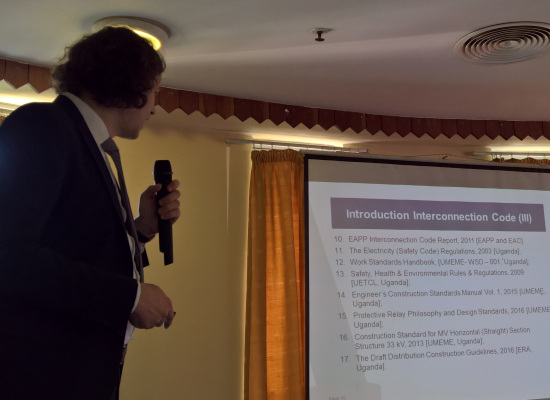
Uganda - Interconnection Code & Wheeling Agreement
The preparation of an interconnection code and a wheeling agreement is part of the GET FiT Uganda Program, launched in May 2013 to promote private investment into renewable energy generation projects in Uganda.
The main purpose of program is to fast-track a portfolio of about 20-25 small-scale renewable energy generation projects (promoted by private developers with a total installed capacity of roughly 150 MW). The overall objective of the present assignment is to enable proper and full evacuation of embedded generators in the future, at allowable national and international techno-economic standards.
The project includes detailed technical and economic requirements for connecting generation facilities to the existing grid and will involve both interconnection and wheeling aspects.
For this purpose, the following work packages constitute the framework of the project:
Part A - Work Package 1: Interconnection and Grid Code for fluctuating renewable energy power integration into the grid
Part B - Work Package 2: Wheeling Agreement for fluctuating renewable energy power wheeling
Part C - Work Package 3: Knowledge Transfer Programme.
intec's services
- Development of an interconnection code for fluctuating renewable based power integration based on technical, legal and commercial issues
- Development of a wheeling agreement for wheeling of fluctuating renewable power according to the current policy and regulatory framework
- Development and test of a model for the computation of wheeling losses
- Proposal for wheeler's grid availability performance guarantees and penalty measures for non-compliance
- Development of a knowledge transfer program
- Conducting two workshops on interconnection and wheeling issues.
Client
Electricity Regulatory Authority (ERA)Financing
KfW EntwicklungsbankPeriod of implementation
05.2016 - 01.2017 -
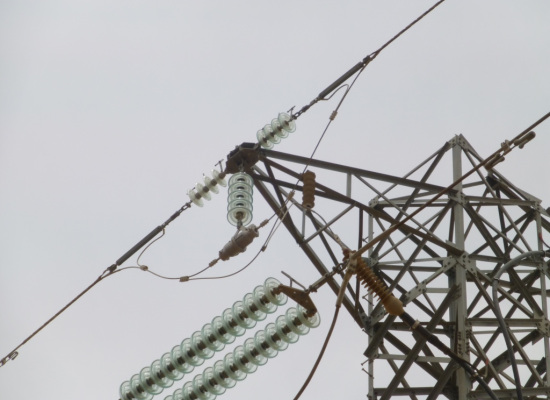
Regional - Interconnexion Project CLSG (Phase 1)
The project included Owner's Engineer services for all pre-construction activities (tender documents, tendering, contract negotiations and award) for the construction of the following equipment:
- 1,303 km of 225 kV overhead line across the four countries; initially one circuit on double circuit steel lattice towers with OPGW
- 12 new 225 kV substations, one in Côte d'Ivoire, four in Liberia, five in Sierra Leone and two in Guinea
- Installation of compensation equipment, static VAr compensators and shunt reactance in five substations
- Development of a control centre in Guinea including a regional SCADA system, frequency control systems, and extension of the NCC in Côte d'Ivoire
- Development of a frequency regulation study, procurement and installation of frequency control equipment
Construction works are executed under 13 different EPC contracts.
intec's services
intec's experts contributed to the following tasks:
Data collection and review of existing documentation
Review and finalisation of technical specifications plus prequalification and tender documents
Assistance during the tendering phase (invitations for prequalifications/tenders; evaluation of prequalifications and bid evaluation including respective reporting)
Assistance in finalising the EPC contracts (contract negotiations, preparation of contract documents)
Review of project implementation schedules and preparation of the Project Implementation Plan (PIP)
Client
WAPP Secretariat on behalf of TRANSCO CLSGFinancing
European Investment Bank (EIB) and World Bank (WB)Period of implementation
09.2014 - 12.2016 -
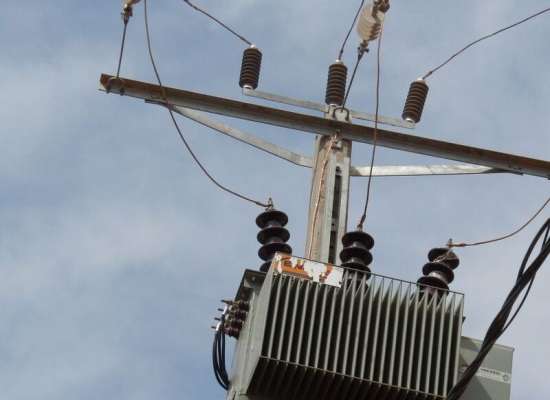
Mali - PASE - Extension of EDM's Transmission and Distribution Networks
The project was part of the ‘PASE’ (Project for the Support to the Energy Sector) for which the World Bank granted a loan to the Government of Mali. The project in general aimed at improving access to electricity, as well as efficiency in the supply and utilisation of electrical energy. The project’s technical measures included the following components:
- Extension of the MV/LV networks in Bamako and Kati
- Construction of the 30 kV Kati Substation
- Reinforcement and extension of the MV/LV networks in Kayes, Sikasso, Koutiala, and Ségou
- Rehabilitation of the 150 kV lines Bamako – Fana, Fana – Ségou, and restructuring of Fana substation connection from T-off to line-in/line-out arrangement
- Extension of the Kalabancoro Substation (transformer 60 MVA, 150/30 kV) and renewal of the 30/15 kV Sotuba Substation
- Extension of the 15 kV SOGEM Substation in Kodialani and installation of 15 kV outgoing feeders
- Installation of the second circuit on the 150 kV Kodialani - Sirakoro line
intec's services
- Overall project management and home-office back-up support for specific tasks
- Coordination of the detailed implementation plan with EDM
- Approval of technical documents and implementation studies
- Technical control of plans and documents
- Factory acceptance tests, monitoring and quality control of manufacturing
- Site supervision
- Budget control and management
- Implementation of the quality management plan and the health and safety plans
- Verification of the environmental protection plan
- Reporting
Client
Energie du Mali S.A. (EDM)Financing
International Development Association (IDA)Period of implementation
02.2014 - 07.2016
Uganda - Interconnection Code & Wheeling Agreement
The preparation of an interconnection code and a wheeling agreement is part of the GET FiT Uganda Program, launched in May 2013 to promote private investment into renewable energy generation projects in Uganda.
The main purpose of program is to fast-track a portfolio of about 20-25 small-scale renewable energy generation projects (promoted by private developers with a total installed capacity of roughly 150 MW). The overall objective of the present assignment is to enable proper and full evacuation of embedded generators in the future, at allowable national and international techno-economic standards.
The project includes detailed technical and economic requirements for connecting generation facilities to the existing grid and will involve both interconnection and wheeling aspects.
For this purpose, the following work packages constitute the framework of the project:
Part A - Work Package 1: Interconnection and Grid Code for fluctuating renewable energy power integration into the grid
Part B - Work Package 2: Wheeling Agreement for fluctuating renewable energy power wheeling
Part C - Work Package 3: Knowledge Transfer Programme.
intec's services
- Development of an interconnection code for fluctuating renewable based power integration based on technical, legal and commercial issues
- Development of a wheeling agreement for wheeling of fluctuating renewable power according to the current policy and regulatory framework
- Development and test of a model for the computation of wheeling losses
- Proposal for wheeler's grid availability performance guarantees and penalty measures for non-compliance
- Development of a knowledge transfer program
- Conducting two workshops on interconnection and wheeling issues.
Client
Electricity Regulatory Authority (ERA)Financing
KfW EntwicklungsbankPeriod of implementation
05.2016 - 01.2017Regional - Interconnexion Project CLSG (Phase 1)
The project included Owner's Engineer services for all pre-construction activities (tender documents, tendering, contract negotiations and award) for the construction of the following equipment:
- 1,303 km of 225 kV overhead line across the four countries; initially one circuit on double circuit steel lattice towers with OPGW
- 12 new 225 kV substations, one in Côte d'Ivoire, four in Liberia, five in Sierra Leone and two in Guinea
- Installation of compensation equipment, static VAr compensators and shunt reactance in five substations
- Development of a control centre in Guinea including a regional SCADA system, frequency control systems, and extension of the NCC in Côte d'Ivoire
- Development of a frequency regulation study, procurement and installation of frequency control equipment
Construction works are executed under 13 different EPC contracts.
intec's services
intec's experts contributed to the following tasks:
Data collection and review of existing documentation
Review and finalisation of technical specifications plus prequalification and tender documents
Assistance during the tendering phase (invitations for prequalifications/tenders; evaluation of prequalifications and bid evaluation including respective reporting)
Assistance in finalising the EPC contracts (contract negotiations, preparation of contract documents)
Review of project implementation schedules and preparation of the Project Implementation Plan (PIP)
Client
WAPP Secretariat on behalf of TRANSCO CLSGFinancing
European Investment Bank (EIB) and World Bank (WB)Period of implementation
09.2014 - 12.2016Mali - PASE - Extension of EDM's Transmission and Distribution Networks
The project was part of the ‘PASE’ (Project for the Support to the Energy Sector) for which the World Bank granted a loan to the Government of Mali. The project in general aimed at improving access to electricity, as well as efficiency in the supply and utilisation of electrical energy. The project’s technical measures included the following components:
- Extension of the MV/LV networks in Bamako and Kati
- Construction of the 30 kV Kati Substation
- Reinforcement and extension of the MV/LV networks in Kayes, Sikasso, Koutiala, and Ségou
- Rehabilitation of the 150 kV lines Bamako – Fana, Fana – Ségou, and restructuring of Fana substation connection from T-off to line-in/line-out arrangement
- Extension of the Kalabancoro Substation (transformer 60 MVA, 150/30 kV) and renewal of the 30/15 kV Sotuba Substation
- Extension of the 15 kV SOGEM Substation in Kodialani and installation of 15 kV outgoing feeders
- Installation of the second circuit on the 150 kV Kodialani - Sirakoro line
intec's services
- Overall project management and home-office back-up support for specific tasks
- Coordination of the detailed implementation plan with EDM
- Approval of technical documents and implementation studies
- Technical control of plans and documents
- Factory acceptance tests, monitoring and quality control of manufacturing
- Site supervision
- Budget control and management
- Implementation of the quality management plan and the health and safety plans
- Verification of the environmental protection plan
- Reporting






